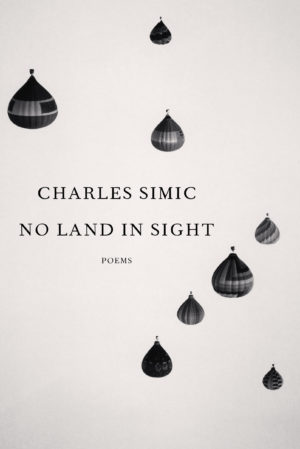No Land in Sight
by Charles Simic
reviewed by Jason Tandon
Charles Simic is not just one of the most celebrated and honored poets of the last fifty years—now in his eighties, he remains one of the most prolific, having released four books since 2015. Fans of Simic’s poetry who have especially enjoyed his newer work such as Come Closer and Listen (2019) and Scribbled in the Dark (2017) will find many of the hallmarks of his recent style in his latest collection, No Land in Sight. The poems are brief, often ten lines or fewer, and they are primarily set in a city (presumably New York City, where Simic has spent much of his time when not in New Hampshire). His persona is a solitary figure who suffers from insomnia and roams the streets at all hours or lies in bed listening to the wind, a portentous sound in Simic’s work. He routinely shows empathy for the homeless, disdain for political leaders, and bemusement at the masses who blindly follow them.
Additionally, Simic’s speaker satirizes the Romantic view of Nature as a retreat from society’s corrupting influence. In the book’s second poem, “All But Invisible,” the speaker observes a “sickly fly” and the setting sun “indifferent to [its] plight.” A gusting wind, depicted as a tormenting, almost sadistic force, is “eager to sweep [the fly] off its feet / and make [it] crawl wingless / On some poorly lit street below.” In “The Mirage,” Simic pokes fun at the Romantic sublime (often experienced by those poets when gazing upon the Alps), as he ironically imagines seeing “on a train approaching Chicago / … a snow-peak mountain.” His satire also encompasses the Greek idyll in yet another “mirage”: he imagines seeing “sheep grazing” in a “green meadow” that’s obscured by the pollution emitted from “huge steel mills.”
What is particularly disturbing about Simic’s vision in No Land in Sight is the absence of human empathy or even common courtesy. In “Everyone is Running Late,” A “young woman / … shout[s] and wave[s] her arms to alert / The bus driver,” but he “eagerly steps on the gas.” In “The Music Box,” the speaker notes a defunct music box in a richly furnished townhouse that “nowadays plays only silence” and asks the wealthy residents if they can now hear the “homeless woman / Comfort a scared little dog by her side / As she spreads rags for their bed / Beneath the marble steps your servants / Used to scrub daily for dirty footprints?” The poem is a single ten-line rhetorical question expressing the speaker’s exasperation at the townhouse residents’ callous indifference. Ironically, they’ve lost some of their wealth—the servants are gone, the music box has been left unrepaired—yet, despite the slight narrowing of the wealth gap, the answer to Simic’s question is “no.”
No Land in Sight consistently presents a despairing, dystopian vision. One of its final poems, “Come Spring,” on a season typically associated with renewal and rebirth, opens with the lines: “Don’t let that birdie in a tree / Fool you with its pretty song, / The wicked are back from hell.” While the presence of a benevolent God is absent from this book, Satan makes several appearances, including in “Come Spring”; his “guile has no equal / Nor does his bottomless hate.” Walking York Beach in Maine, a state known as “Vacationland,” Simic imagines that the “rough and surly waves / Look like they wouldn’t mind / Drowning a pair of unhappy lovers.”
If there’s an answer to the misery presented in this book, the poem “In the Lockdown” offers a surprising one: religion. The speaker likens his life in quarantine to that of a Christian anchorite, a person who withdraws from secular life in order to live a life of prayer and asceticism in a cell-like room. The speaker claims these people “Thriv[ed] in some hole-in-the-wall // Where they found lasting peace / Obeying a voice in their heads / Telling them to just sit quietly.” Nodding to Eastern spirituality, the speaker concludes that silence “can teach them / Everything they ought to know.”
In the book’s final poem “The Wind Has Died,” however, the speaker remains aimless and adrift. Without propulsion or a clear destination, the brief, two-couplet poem is an utterance of quiet resignation:
My little boat,
Take care.There is no
Land in sight.
The poem’s tone and its placement in the book also suggests a speaker nearing death. The boat, if taken as a metaphor for the body, will remain on earth adrift as the soul anticipates the unknown, which one can only hope will be a better place than what No Land in Sight depicts.
Published on November 29, 2022

